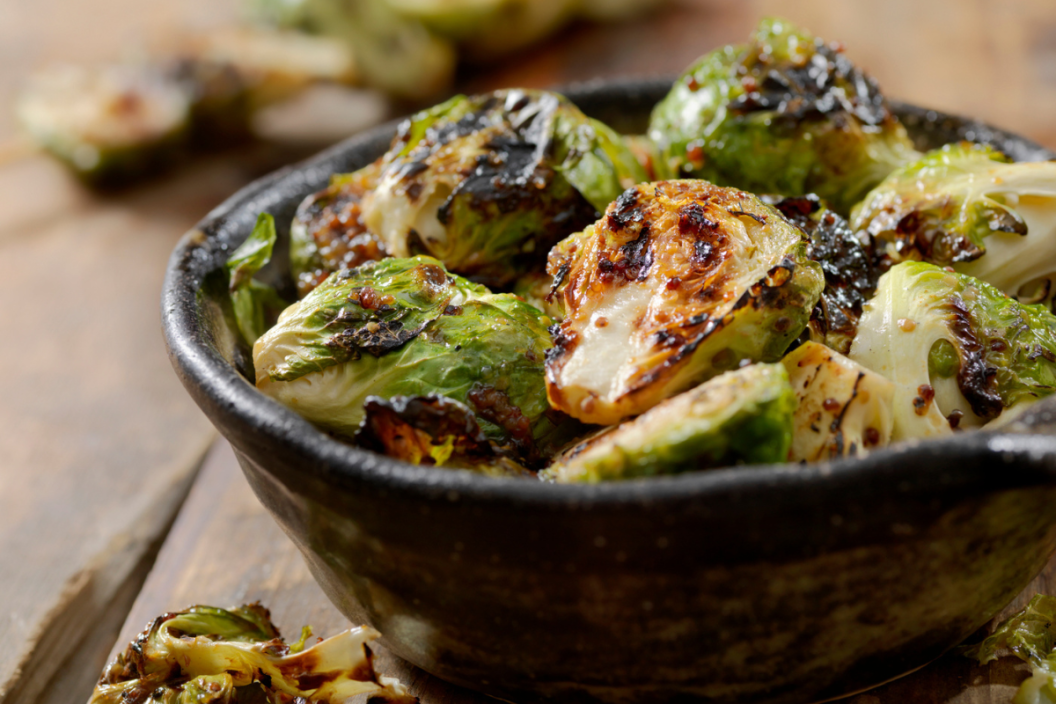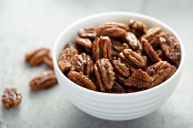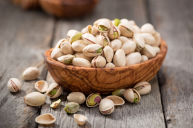Brussels sprouts get a bad rap as one of the vegetables to avoid, especially among kids. Fortunately, as we get older, our taste buds mature and we learn to enjoy the taste of cruciferous vegetables like Brussels sprouts. As delicious as roasted Brussels sprouts are, it's not just their taste that we love. There are a plethora of amazing health benefits of Brussels sprouts that make it well worth it to add them to your plate.
Videos by Wide Open Country
10 Health Benefits of Brussels Sprouts
These miniature cabbages are not only tasty, but they are packed full of amazing health benefits and important nutrients. These carb-free little greens have the power to fight heart disease, boost your immune system and even fight off your risk of cancer.
1. Help Prevent Diabetes

Getty Images/TheCrimsonMonkey
Brussels sprouts contain antioxidants, but one in particular, alpha-lipoic acid, has been shown to lower glucose levels and increase insulin sensitivity, an important nutrition fact for preventing diabetes.
Saroj Kumar, nutritionist and founder and director of Health Review Live says, "The antioxidant alpha-lipoic acid is found in Brussels sprouts (ALA). This compound can lower glucose levels, make insulin more sensitive, and stop changes caused by oxidative stress in people with diabetes." Because of this, Brussels sprouts are an ideal addition to one's diet for those with diabetes.
2. Skin Health and Anti-Aging
Not only do Brussels sprouts help with managing diabetes, they can also aid with skin health, protecting the skin from UV rays and eliminating wrinkles.
Kumar says, "Incorporating vitamin C into your diet may aid in protecting skin cells from UV damage and pollution. Vitamin C is essential for the creation of collagen, a protein that helps to maintain the skin's firmness and flexibility. Vitamin C may also prevent free radical damage and is required for collagen development. This may eliminate wrinkles and enhance the overall texture of the skin."
"Additionally, Brussels sprouts are an excellent source of provitamin A in the form of beta-carotene, which is essential for maintaining healthy skin. The beta-carotene content of one cup of raw Brussels sprouts is 396 micrograms (ug)."
3. High in Fiber
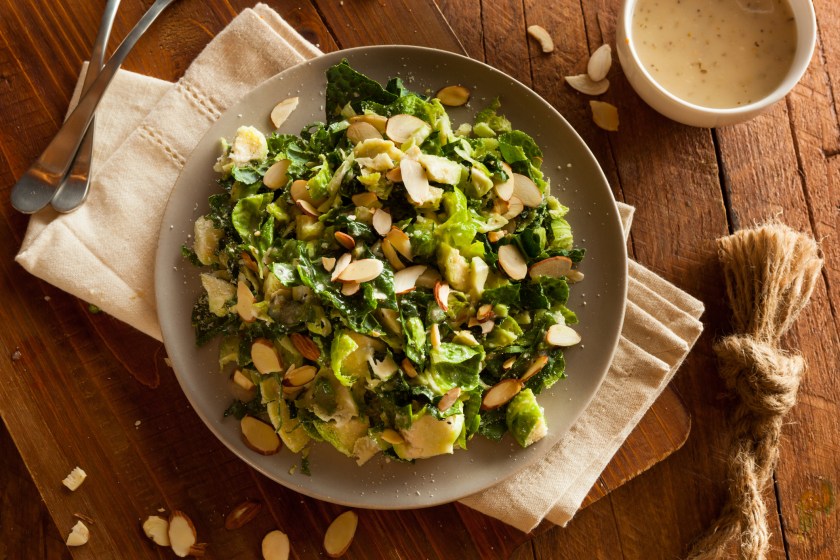
Getty Images/bhofack2
Eating fiber, especially from the cruciferous vegetable family, helps keep your tummy regular and your digestive system working normally. A half-cup of Brussels sprouts gives you about 2 grams of daily fiber. In terms of this benefit of Brussels sprouts, Kumar says, "These delicious tiny vegetables are loaded with fiber, which may enhance your digestive health in several ways. A diet high in fiber is necessary for a healthy gut and body since it prevents constipation and reduces the risk of colon cancer."
4. Maintain Healthy Blood Sugar Levels
Along with being full of nutrients, Brussels sprouts help maintain healthy blood sugar and blood pressure levels. The fiber in the sprouts slows down the absorption of sugar into the blood, which regulates it.
Nutritionist Kumar says, "The fiber in Brussels sprouts (about 4 grams per cooked cup) helps manage blood sugar levels, promotes digestive health, and nourishes the healthy gut flora associated with positive mood, immunity, and anti-inflammatory properties."
5. Reduce Inflammation
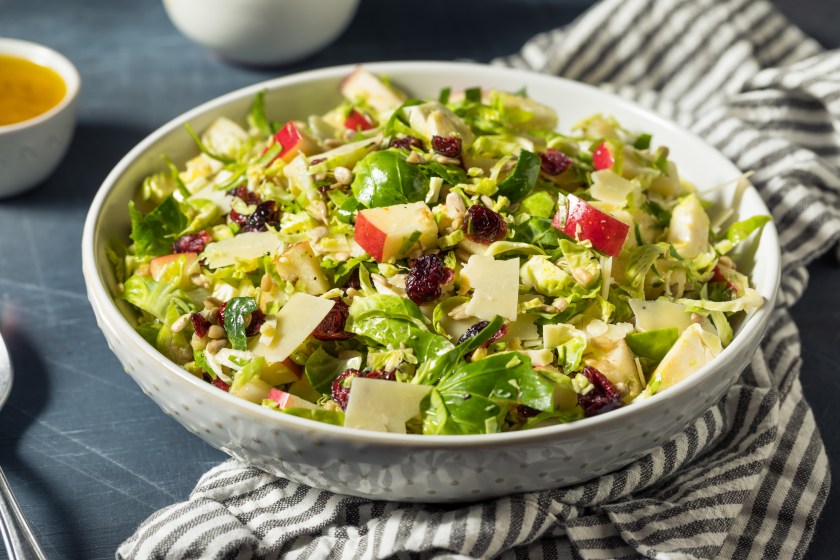
Getty Images/bhofack2
Brussels sprouts are also shown to reduce inflammation. As Saroj Kumar explains, "Since Brussels sprouts are rich in antioxidants, they may help neutralize pro-inflammatory free radicals. Eating cruciferous vegetables such as broccoli and Brussels sprouts as part of a well-balanced diet helps prevent undesirable inflammation in the body. Over time, inflammation may lead to chronic illness, so providing your cells with a healthy dose of vegetables, such as those included in this roasted green vegetable medley, helps protect them."
For people who suffer from arthritis, gout or other inflammatory conditions, Brussels sprouts are the perfect anti-inflammatory vegetable to add to the dinner plate.
6. Rich in Antioxidants
Brussels sprouts are also rich in antioxidants, which are essential to your health. Kumar says, "The antioxidants in Brussels sprouts include vitamin C, beta-carotene, kaempferol, and sulfur-based compounds. Consuming Brussels sprouts as part of a diet rich in fruits and vegetables may help provide your body with the antioxidants it needs for optimal health.
7. Help Prevent Cancer
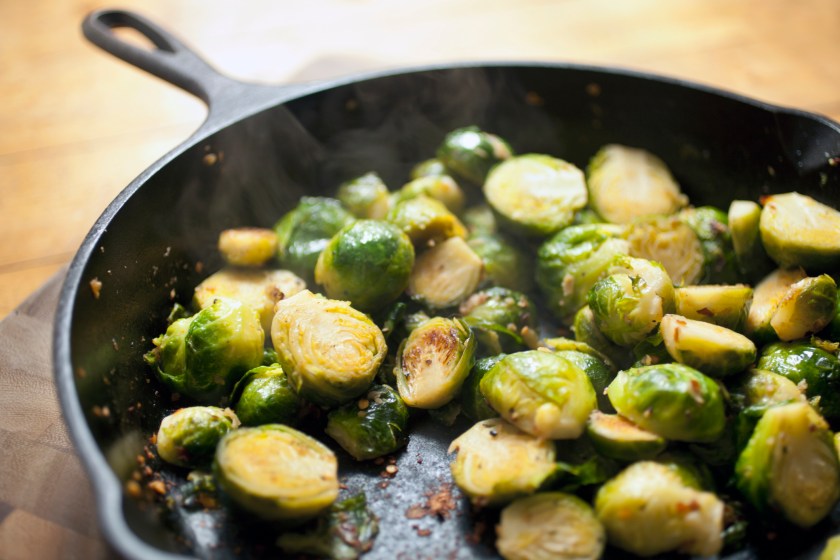
Getty Images/Lara Hata
Studies show that eating Brussels sprouts could protect against carcinogens.Kumar confirms this, explaining, "A natural sulfur-based substance called glycosinolate glucobrassicin is found in a lot of Brussels sprouts. This substance may help stop damage to your DNA that can make you more likely to get cancer. It may also stop cancer cells from making new blood vessels. If you eat a lot of Brussels sprouts and other cruciferous vegetables, you may be less likely to get stomach, lung, kidney, breast, bladder, or prostate cancer."
8. Maintain Healthy Vision
As Kumar states, "Brussels sprouts are really beneficial for the eyes. The body can convert the antioxidant pigment beta-carotene into vitamin A. (which is important for vision). The Brussels sprouts carotenoids lutein and zeaxanthin are also beneficial for the eyes. Lutein and zeaxanthin are two of the major pigments in your eyes. Researchers have discovered that the presence of lutein and zeaxanthin in foods may protect the eyes against blue light and oxidative damage."
Because of the carotenoids in Brussels sprouts, this veggie is a good choice for eye health, helping to protect against damage.
9. Rich in Vitamin K
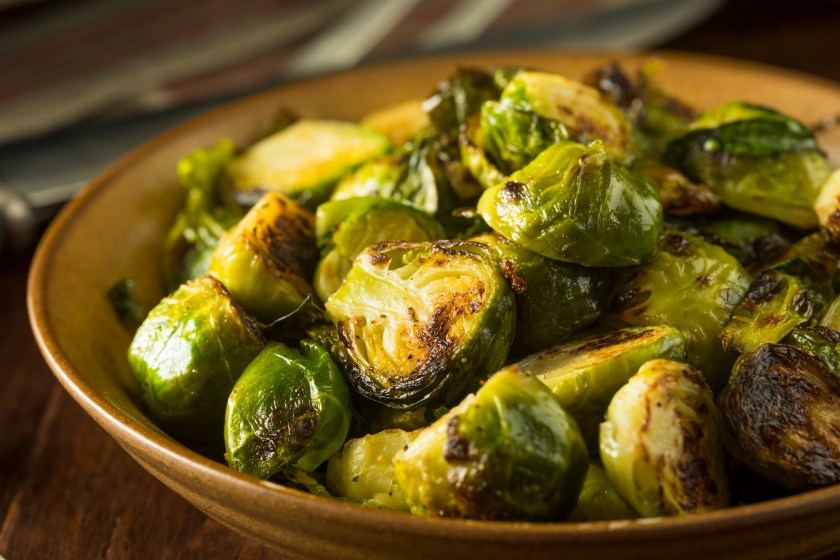
Getty Images/bhofack2
Vitamin K is an essential nutrient your body needs to help form coagulation whenever you get a cut, plus it plays a role in bone health. Half a cup of cooked Brussels sprouts provides you with 137% of your daily vitamin K needs.
In regards to this benefit of Brussels sprouts, Kumar explains, "Brussels sprouts contain a significant amount of vitamin K. This essential vitamin performs an essential function in the organism. It is necessary for coagulation, which is the production of blood clots that halt bleeding. Vitamin K may also have a function in bone development and may protect against osteoporosis, a disease characterized by gradual bone loss."
10. Contain ALA Omega-3 Fatty Acids
Don't like eating seafood? Brussels sprouts are your answer. Omega-3 fatty acids have been shown to slow cognitive decline and decrease inflammation, with fresh seafood being the best place to get the fatty acids. Thankfully Brussels sprouts are a great alternative, with half a cup providing 12% of the daily requirement for women and 8% for men.
Nutritionist Kumar says "Omega-3 fatty acids are essential for brain function, heart health, and the regulation of inflammation. A cup includes 0.16 grams of alpha-linolenic acid, the primary omega-3 fat used by our bodies, which is around 10 percent of our daily omega-3 requirements."
This article was originally published on Sep 19, 2019.
